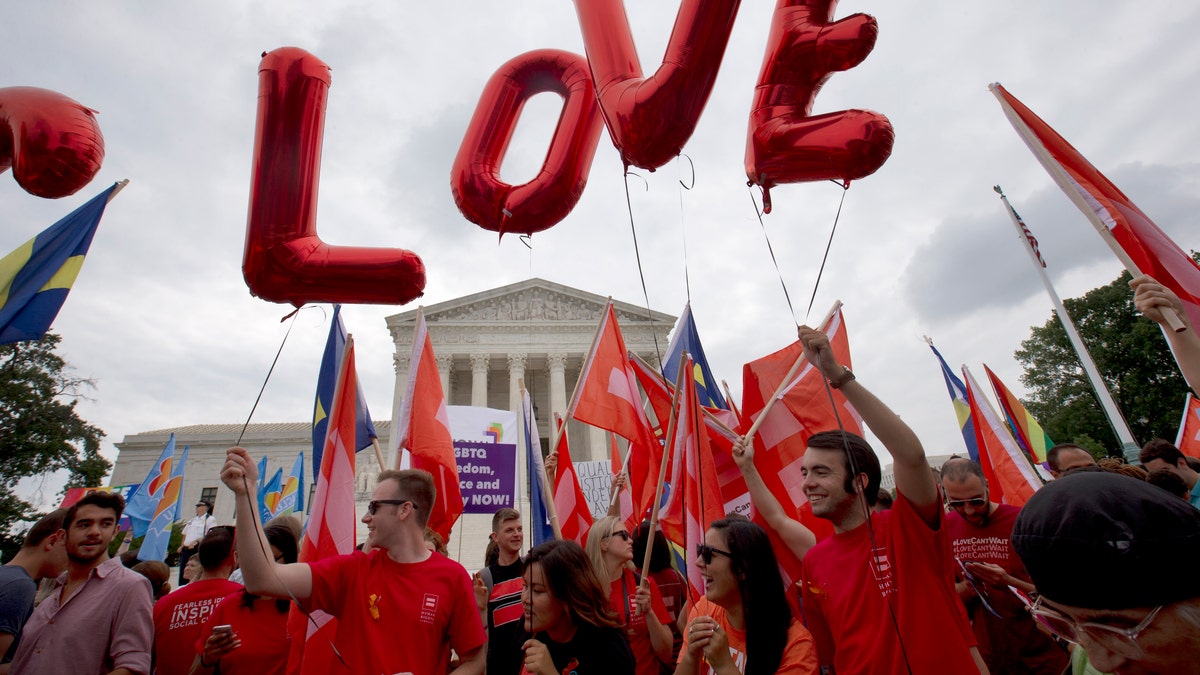
Balloons spell out the word "love" over the Supreme Court in Washington, Friday June 26, 2015, after the court declared that same-sex couples have a right to marry anywhere in the US. (AP Photo/Jacquelyn Martin)
Gay marriage is the new normal -- or is it? The Supreme Court ruling that the Constitutions grants a right to same-sex marriage catches up with the seismic cultural shift on how we define the label of marriage. It is a ruling to be celebrated as much as it is an invitation to re-examine our use of unexamined labels and strengthen the institution of marriage.
As an ordained Episcopal priest, one of the greatest privileges of my life has been to officiate at the weddings of hundreds of couples. I relish the privilege of participating in their joy as they publicly commit their life and love to one another. Most of them are married in a religious ceremony but in the eyes of the law, the act of marriage I was officiating at was a civil contract. My role as the officiant was possible because the State in which the marriage took place granted me the authority to perform the marriage.
My joy and delight in each marriage was never diminished but it was a stark reminder that marriage was not possible for me as a gay man. Marriage was a label and an institution for others. And then the unthinkable happened. The “everything but marriage” civil unions that many States legalized smelled of “separate but not equal.” The marriage equality movement in the United States began to re-examine whether marriage could only be between a man and a woman.
Like many gay and lesbian couples, my partner and I had an attorney to make certain that our legal affairs were ordered to provide us with as much protection as possible – protection that was only fully provided by the institution of marriage.
I was unprepared for the significance of what it meant to say “I do” and to be pronounced as “husband and husband.” It was not about the label of being gay or straight; it was not about the label of marriage. It was about the celebration of the institution of marriage we were being entered into and being affirmed by our family and friends.
In 2004 when two counties in Oregon issued marriage licenses to same-sex couples before the State passed a constitution amendment to define marriage as being between a man and a woman, a Seattle television station contacted us to ask if we would get married in Oregon. They wanted a camera crew to follow us and film our wedding. Like many Americans on both sides of the question we were having a conversation about marriage. Our wedding was about us, not a media event. So we demurred until the time when marriage would be legal in our home State of Washington.
When Washington State created a Domestic Partnership registry in 2008 we signed up. It was a step forward but it was not marriage. Regardless of what the law denied us we considered ourselves to be married in everything but name. But of course we were not.
As religious institutions entered the conversation about same gender union ceremonies versus marriage ordinary Americans were having their own conversations on the topic, often informed by the lives of gay and lesbian couples they knew. Many discovered that religious and legal understandings of marriage have never been static.
The millennial generation led and shaped the conversation about the label of marriage. Well over seventy percent of that generation support same-sex marriage. The legalization of same-sex marriage in countries as diverse as South Africa, Canada, Uruguay, Spain and Argentina offered context to the conversation.
I was surprised in November 2012 by the first response I received from an email to our friends asking them to consider supporting the Washington ballot initiative to approve same-sex marriage. It came from a friend who describes himself as a supporter of “Constitutional Justices.” He said he and his wife wanted my partner and me to share in and enjoy the liberties of marriage that had blessed their lives.
The conversation about marriage did not have a straight line running through it.
Beyond the label of gay or straight they wanted us, and couples like us, to share in the liberties and protections of the conservative institution of marriage.
When same-sex marriage became legal in Washington State we needed to do nothing – our status as registered Domestic Partners would be automatically rolled over to that of “married” unless we asked the State to do otherwise. Did we actually need to have a marriage ceremony?
Like the hundreds of couples whose weddings I have officiated at we chose to have our families and close friends participate in a wedding celebration. Those gathered included staunch Republicans and Democrats, devout religious people and those who have little or no religious affiliation. There were Millenials, plenty of Baby Boomers and our beaming eight-six-year old grandma.
The joy was palpable. Yes, we were entering into the civil legal contract of marriage of the State we were in -- but there was much more!
I was unprepared for the significance of what it meant to say “I do” and to be pronounced as “husband and husband.” It was not about the label of being gay or straight; it was not about the label of marriage. It was about the celebration of the institution of marriage we were being entered into and being affirmed by our family and friends.
It mattered profoundly.
Same-sex marriage is the new normal for us. It is the new normal of the laws of the United States. It may not be the new normal for others.
Irrespective of your position it is an invitation to re-examine assumptions about marriage, the labels we use and even to strengthen the institution of marriage.
